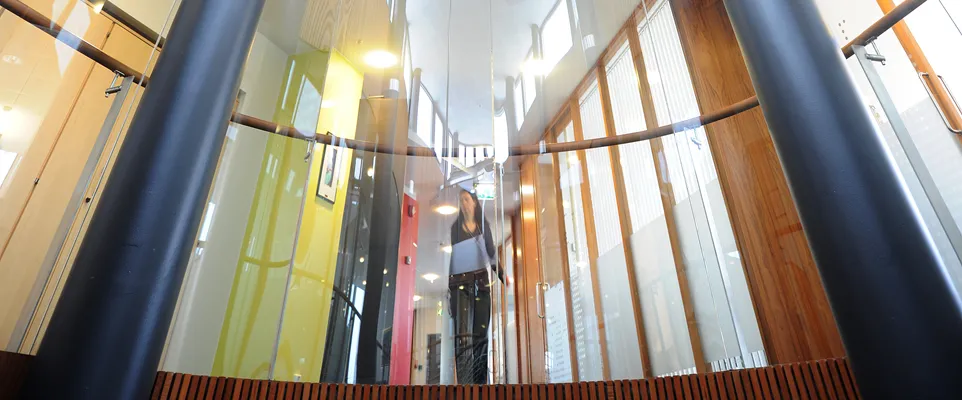 From Petoro’s head office in Stavanger. Photo: Anne Lise Norheim Expertise as a strategic competitive edgeNashater Deu Solheim recently became vice president for strategy and organisation in Petoro. Educated as a clinical psychologist, she has experience from several sectors in the UK and from Norway’s petroleum industry – including head of learning and development at Statoil. She shares her visions for her new job, and for Petoro. | |||
How are strategy and organisation actually related? Linking the business strategy to the development of expertise in the organisation is incredibly important. Peter Senge, a well-known scientist, has observed that the only sustainable competitive edge in the long term is the ability to learn faster than your competitors. The key issue isn’t what you know, but how you exploit your collective knowledge to achieve commercial results. You can have a very competent organisation, but effective information-sharing and collaboration boost the pace of innovation and confer competitiveness. Many big organisations struggle to know what they know – they have problems identifying the knowledge resident in the brains of all these competent people. They need to develop their systems, processes and culture in a way which promotes effective collaboration. Their overall expertise then becomes greater than the sum of each individual’s knowledge. This collective knowledge becomes the distinctive feature of the organisation. Each individual’s ability and willingness to work in accordance with such a methodology determines whether it succeeds in innovating ahead of its competitors, in being the first to see the opportunities, and in breaching barriers. Why is this particularly relevant for Petoro? We’re a driving force on the Norwegian continental shelf (NCS), backed by highly competent personnel. A compact organisation covering many licences provides broad insights and a good basis for spotting trends early and for learning across licences and companies. Our ability to exploit the individual’s expertise in a collective manner will encourage the development of new ideas and better solutions. This is critical for our competitiveness, particularly because we’re not an operator but a proactive partner on the NCS. | “It’s our collective expertise which makes us special, together with our ability to apply that competence to influence what happens on the NCS.” Nashater Deu Solheim It’s our collective expertise which makes us special, together with our ability to apply that competence to influence what happens on the NCS. We then need to be quick off the mark, think strategically and take a long-term view of value creation. It’s important for us to ensure that we’ve got the right expertise and that we’re able, through a culture of collaboration, to exploit this in the best possible way to apply our strategy. Is this primarily a question of attitudes, or are you thinking of systems? I divide this into three factors, with each employee’s expertise – skills and knowledge – as the first of these. Second, we need to achieve a more effective collaboration which, supported by technology, equips us to find the knowledge, share it and cooperate effectively in the global reality we’re part of. The development of new digital methods for relating to and sharing with each other has happened very quickly and is boosting the speed of innovation. We must find ways of satisfying the appetite of new generations for network-building and cooperation via social media, and use this as a way of learning and training in a job context. | Third, we have to be a dynamic expertise-based organisation without raising operating costs too much. That means not all expertise needs to be found among our 60-70 staff at all times. We must also utilise our network and our access to external sources of knowledge in order to expand our overall competence. In my view, these are essential requirements if we’re to become an even more effective learning organisation. Where are you starting this work? The most important consideration for me is to understand our role and function. Where can we create value, how can we influence the agenda for the NCS, how do we exert the biggest effect? It’s also naturally necessary to define what sort of expertise is required for achieving these goals – what we have and what we need. | Nashater Deu Solheim Vice president strategy and organisation Education: Clinical psychology and PhD in psychology from the University of Surrey Career: With Statoil from 2009, vice-president for learning and development from 2012. Worked professionally for 20 years on management and organisational development in large and complex organisations such as Statoil and the UK defence department, and in the British public and private health sector. Has also developed her own companies. |

